By Hassan Osman Kargbo
The Ministry of Basic and Senior Secondary Education (MBSSE) has established 367 new classrooms across Sierra Leone aimed at enhancing educational accessibility in underserved communities.
This initiative is part of the Free Education Secretariat Project (FESP), which received a total funding of $106 million, geared towards building school structures with the goal to make education priority for every child in the country.
During a recent nationwide school commissioning event, FESP Project Coordinator, Ambrose T. Sesay emphasized the importance of education in President Julius Maada Bio’s agenda. “Education remains one of the single most important elements of our government’s goals,” he stated, expressing his satisfaction in handing over the new facilities to community leaders.
Sesay highlighted that 80 percent of the project’s funding has already been utilized, and added that all the schools have the provision of first aid kits nationwide. He noted that the initiative not only focuses on building classrooms but also on training teachers and addressing foundational learning for an estimated 120,000 out-of-school children, particularly street children.
In his address to community members, Sesay urged local leaders, youth, and stakeholders to take ownership of the new structures and ensure their maintenance, remarking that “the school does not serve the present generation but also future generations.”
While explaining the importance of education in harder-to-reach communities, Sesay also highlighted the amenities the schools are equipped with, creating a conducive environment that not only retains children in schools but also endears them to education
The coordinator said that the project aims to prioritize education for every child, strengthen foundational learning, and improve accessibility across Sierra Leone.
He noted that the necessity of retaining children in schools, urging parents and caregivers to actively monitor their children’s educational engagement to prevent dropouts.
He also called on community leaders to commit to protecting and securing the new facilities, noting that “no one else can better safeguard the buildings than the communities themselves.”
Addressing the issue of girl child education, Sesay urged families to make concerted efforts to keep girls in school, emphasizing their vulnerability compared to boys.
Asked when the project will come to an end, he said it supposed to end in September this year, but because of the second additional finance they received in 2023, he confirmed that the project’s life has been extended to December 2027.
The initiative is funded by the Government of Sierra Leone, the World Bank, and other development partners, reinforcing President Bio’s commitment to enhancing the country’s educational landscape.












